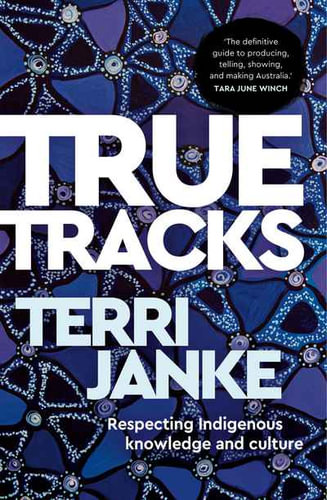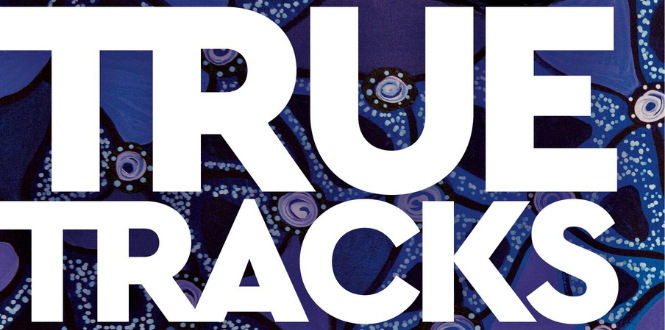Terri Janke is an Indigenous lawyer of Meriam and Wuthathi heritage. In 2000 she set up a law firm, Terri Janke and Company, focusing on Indigenous Cultural and Intellectual Property (ICIP) law and commercial law. She has acted for Indigenous and non-Indigenous clients, artists, community-controlled organisations, government and corporates.
Today, Terri Janke is on the blog to answer a few questions about her new book, True Tracks: Respecting Indigenous knowledge and culture. Read on …
Please tell us about your book, True Tracks!
TJ: True Tracks is a guide for respecting and working with Indigenous knowledge and culture. It is based on the True Tracks® Principles which provide a best practice framework for ethical engagement. The principles have been applied in the arts, museums and galleries, archives, science, education and government. The book is about following these principles to create a deeper and more meaningful engagement to empower Indigenous peoples, for the benefit of all.
Why do you think people keep getting it wrong when it comes to respectfully engaging with Indigenous knowledge and culture?
TJ: I think it is about education and understanding, people do not know what to consider before engaging with Indigenous knowledge and culture, or they do not know the cultural protocols to follow. There are also cases where people knowingly do the wrong thing, but my focus has always been on goodwill and laying the tracks that people can follow. We have come a long way, and there is still further to go.
What does ethical and respectful engagement look like in a nutshell?
TJ: In a nutshell, ethical and respectful engagement is meaningful engagement where Indigenous peoples are informed and involved in projects from the start and kept informed throughout. It involves processes that ensure cultural integrity, it gives attribution to the source communities and there is benefit sharing.
What are some of the wider benefits of adopting the guidelines you propose in True Tracks?
TJ: The wider benefits of following the True Tracks principles includes growing long-term relationships with Indigenous people, getting better quality products and also enabling economic development for Indigenous peoples. For all of us there are benefits in finding solutions to the issues we collectively face in the world. This will lead to a better future for all Australians, while empowering the people of the oldest continuing living culture on the planet.
This book is based on your PhD thesis from the Australian National University. Can you tell us a little bit about the process of adapting that thesis into this book?
TJ: My PhD Thesis gave me a chance to engage in the deeper thinking behind the True Tracks principles. Adapting this into a book saw me recompile and present the ideas in a relatable and practical way for people working in many different industries, not just the academic audience of a PhD. I made voice recordings and looked back over years of my work to bring it all together, including some of my personal stories and connections to the subject areas of each chapter. It was like mining through my old journals to find the gold. I also reached out and consulted with many people and organisations whose stories and projects have been featured throughout the book. I was also assisted by a smart young woman, Gabriela Dounis who is a research assistant on our team. Gabriela’s coordination of clarifications and permissions kept the project on track.
‘Ethical and respectful engagement is meaningful engagement where Indigenous peoples are informed and involved in projects from the start and kept informed throughout.’
Who do you wish would read this book?
TJ: This book is meant to inform and inspire people working across many industries – from the arts to science, tourism, technology, research and government. It is for creators, consumers, leaders, changemakers and people working on the ground supporting our Indigenous communities.
Your background is in law, specifically Indigenous Cultural and Intellectual Property (ICIP). How did you come to be interested in this kind of work?
TJ: I came to be interested in ICIP because of my own Indigenous cultural heritage and my interest and passion for arts and culture. When taking a break from my law studies, I worked at the Australia Council for the Arts. This heightened my awareness of the growing Indigenous arts sector, but the gap in the recognition of Indigenous cultural expression. I wanted to assist Indigenous artists in their call for greater protection of their arts. I also wanted to make a difference and help Indigenous people to thrive and innovate in business. This was also about educating those who engage with Indigenous people, so I wanted to bridge the gap so that there could be more collaborations that worked for both sides.
Can you tell us about some recent projects you’ve been working on?
TJ: I have been working on a number of projects in arts, heritage, film and the environment.
What is the last book you read and loved?
TJ: The last book I read and loved was Bila Yarrudhanggalangdhuray by Anita Heiss. The story weaves us through a forgotten history of Aboriginal heroes, their families and community, the colonial past which limited people’s choices, friendship, and the timeless connection Wiradyuri people have to the river.
What do you hope readers will discover in True Tracks?
TJ: I hope readers will discover a positive way to develop collaborative and meaningfully projects that truly value Indigenous knowledge, where Indigenous people and non-Indigenous people can work on projects that are stunning, informative, ground-breaking and bring mutual benefit.
And finally, what’s up next for you?
TJ: My law firm is growing, so I will be working to support the great team of lawyers we have at Terri Janke and Company. We continue to do workshops on the True Tracks principles in many different industries from arts, museums and galleries, construction, science and technology.
I also am going to write my second novel.
Thanks Terri!
—True Tracks: Respecting Indigenous knowledge and culture by Terri Janke (NewSouth Publishing) is out now.

True Tracks
Respecting Indigenous knowledge and culture
Indigenous cultures are not terra nullius -nobody's land, free to be taken.
True Tracks is a ground-breaking work that paves the way for the respectful and ethical engagement with Indigenous knowledges and cultures. Combining real-world cases and personal stories, award-winning Meriam/Wuthathi lawyer Dr Terri Janke draws on twenty years of professional experience to inform and inspire leaders across many industries; from art and architecture, to film and publishing, dance, science and tourism...







 The FAB Award is back – and it’s time to cast your votes!
The FAB Award is back – and it’s time to cast your votes!  Top 10 book deals for Black Friday!
Top 10 book deals for Black Friday!  Bestsellers: Scott Pape and Ash Barty continue to prove a hit with readers!
Bestsellers: Scott Pape and Ash Barty continue to prove a hit with readers!
Comments
No comments